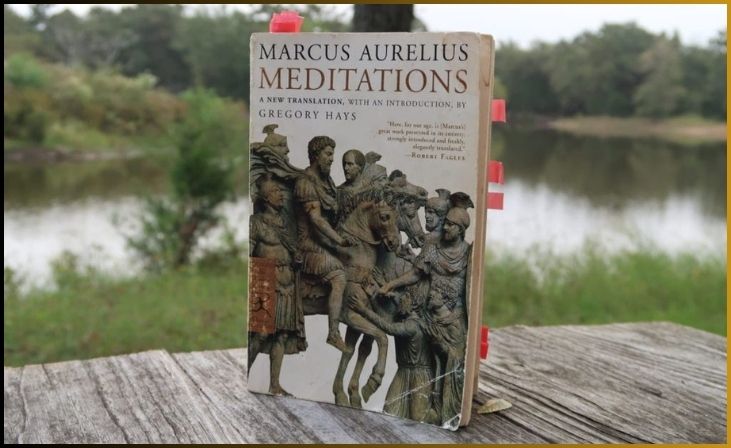Philosophy, hailed as the quest for wisdom itself, serves as a beacon illuminating the complexities of life, morality, and the very core of existence. In our exploration, we embark on a journey through six seminal philosophy books—cornerstones that have not only left an indelible mark on human thought but continue to spark the flames of intellectual curiosity across generations.
These books aren’t mere texts; they’re gateways to profound understanding and contemplation. They’re the reservoirs from which streams of timeless wisdom flow, offering insights that transcend the confines of time and culture.
Table of Contents
ToggleMust Read 6 Philosophy Books
They’re not just books; they’re keys unlocking the doors to the vast expanse of human thought and the relentless pursuit of wisdom.
1. “Meditations” by Marcus Aurelius: Stoic Insights into Life

In “Meditations,” Marcus Aurelius, the revered Roman Emperor, bestows upon us a timeless treasure—a classic work resonating with profound Stoic wisdom. Within its pages, Aurelius offers a deeply introspective journey into Stoic philosophy, serving as a guiding force through reflections that delve into the core tenets of resilience, self-discipline, and the pursuit of a purpose-driven existence.
This remarkable work isn’t just a book; it’s a reservoir of insights—a distillation of Aurelius’s contemplations on life’s intricacies. Through his musings, readers are invited to navigate the complexities of human experience, confronting challenges with fortitude and embracing the virtue of self-mastery.
Also Read: Book Review–Fermentation for Beginners
2. “Thus Spoke Zarathustra” by Friedrich Nietzsche: A Journey into Existentialism
In “Thus Spoke Zarathustra,” Nietzsche escorts readers on a profound philosophical odyssey, delving into the realms of existentialism, the potent concept of the will to power, and the enigmatic figure of the Ubermensch. This masterwork serves as an intellectual expedition, challenging the very foundations of conventional thought and beckoning readers to embark on a transformative journey of self-reflection and reevaluation of values.
Nietzsche’s work isn’t a mere philosophical treatise; it’s an invitation to explore the depths of human existence and consciousness. Through intricate narratives and profound aphorisms, he dismantles established norms, urging readers to scrutinize their beliefs, question societal constructs, and forge their own path to meaning and authenticity.
What sets “Thus Spoke Zarathustra” apart is its audaciousness—its fearless confrontation of prevailing ideologies.
3. “The Republic” by Plato: Foundations of Western Philosophy
Plato’s “The Republic” stands tall as a foundational pillar of Western philosophy, its enduring significance stemming from its exploration of profound concepts through Socratic dialogues. Within this magnum opus, Plato embarks on an intellectual voyage delving into the multifaceted dimensions of justice, politics, and the intricate nature of an ideal state.
Don't just scroll, subscribe!
BuzzTrail's unique web-stories are the cure for boredom you've been waiting for.
Through thought-provoking exchanges and philosophical musings, Plato navigates the intricacies of human existence, probing the essence of justice and the complexities of governance within society. The dialogues, led by Socrates, serve as a conduit for exploring ethical dilemmas, political structures, and the very fabric of a virtuous society.
What distinguishes “The Republic” is its profound influence on the landscape of political thought and ethical discourse. Plato’s insights, articulated through Socratic conversations, continue to resonate across millennia, shaping philosophical debates and challenging the fabric of societal norms.
4. “Beyond Good and Evil” by Friedrich Nietzsche: Challenging Moral Values
In “Beyond Good and Evil,” Nietzsche thrusts readers into a realm of intellectual upheaval, provocatively challenging the bedrock of conventional moral values. This profound work serves as a philosophical battleground, where Nietzsche boldly questions and deconstructs traditional notions of right and wrong, introducing provocative concepts such as master and slave morality. Through this exploration, he dismantles the binary constraints of morality, urging readers to confront their ethical foundations and venture into a realm beyond the confines of conventional beliefs.
What sets “Beyond Good and Evil” apart is its audacious confrontation of established moral norms. Nietzsche’s relentless critique dismantles the simplistic dichotomy of good versus evil, inviting readers into a realm of intellectual turbulence where the very essence of morality is put under scrutiny.
5. “Critique of Pure Reason” by Immanuel Kant: Navigating the Limits of Knowledge
Immanuel Kant’s “Critique of Pure Reason” stands as a monumental philosophical odyssey, venturing deep into the labyrinth of human understanding and the boundaries of knowledge itself. Within this seminal work, Kant navigates the intricate terrain of human cognition, probing the fundamental limits and nature of what can be known. Through the introduction of concepts like a priori knowledge and the elusive noumenal world, Kant reshapes the landscape of epistemology, laying the foundational stones upon which modern inquiries into knowledge rest.
What distinguishes “Critique of Pure Reason” is its audacious attempt to demarcate the boundaries between what can and cannot be known. Kant’s exploration of a priori knowledge—those truths inherent within human cognition—and the concept of the noumenal world—a realm beyond empirical perception—challenges the very fabric of how we comprehend reality.
Also Read: Korea Town–A Book Review
6. “Being and Nothingness” by Jean-Paul Sartre: Embracing Existential Freedom
In “Being and Nothingness,” Jean-Paul Sartre embarks on an existential journey, crafting a masterpiece that delves into the very essence of existence itself. This profound work serves as a cornerstone of existentialist philosophy, unraveling the intricate threads of freedom, consciousness, and the complex interplay between being-in-itself and being-for-itself. Sartre’s exploration challenges readers to confront the inherent responsibility that accompanies our freedom, urging us to grapple with the weighty implications of our choices and existence.
What distinguishes “Being and Nothingness” is its unyielding scrutiny of human freedom and consciousness. Sartre dismantles traditional notions of being, positing that existence precedes essence—affirming that we define ourselves through our actions and choices.
Conclusion
Embarking on a journey through these six must-read philosophy books becomes a transformative odyssey, traversing the profound depths of human thought and existential inquiry. Each book, a testament to philosophical brilliance, serves as a guidepost, illuminating the complexities of existence, morality, and the very fabric of reality. From Plato‘s exploration of justice to Nietzsche’s provocative challenges to moral values, these texts stand as timeless treasures, offering insights that continue to shape the contours of philosophical discourse. They beckon readers to embark on a continuous quest for wisdom, sparking introspection, challenging beliefs, and inviting contemplation of life’s most profound mysteries.
FAQs
Are these philosophy books suitable for beginners in the field?
Are these philosophy books suitable for beginners in the field?
Absolutely! While some texts might seem challenging, they offer profound insights accessible to both newcomers and seasoned philosophers.
Do these books represent diverse philosophical perspectives?
Do these books represent diverse philosophical perspectives?
Indeed! They span diverse schools of thought—ranging from ancient Greek philosophy to existentialism—offering a rich tapestry of ideas and perspectives.
How can I apply the wisdom from these books to daily life?
How can I apply the wisdom from these books to daily life?
These books offer philosophical principles that can influence decision-making, ethical considerations, and perspectives on various life aspects.
Are these texts purely theoretical or do they offer practical insights?
Are these texts purely theoretical or do they offer practical insights?
They strike a balance, providing theoretical foundations while also offering practical implications applicable to everyday life and human experience.
Is there a recommended reading order for these philosophy books?
Is there a recommended reading order for these philosophy books?
While there’s no strict sequence, starting with foundational texts like Plato’s “The Republic” might provide a good entry point into philosophical exploration. However, feel free to explore based on personal interests and curiosity.

